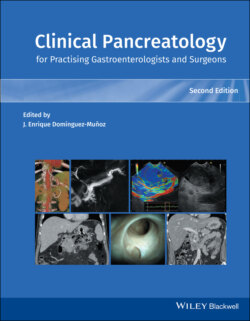Читать книгу Clinical Pancreatology for Practising Gastroenterologists and Surgeons - Группа авторов - Страница 163
Urgent ERCP
ОглавлениеOngoing biliary obstruction in ABP patients is diagnosed based on clinical signs such as worsening abdominal pain and jaundice, coupled with liver function test abnormalities [18], while fever in this clinical setting usually points to acute cholangitis. There is also a potential role for urgent endoscopic ultrasound (EUS) for the diagnosis of CBD stones in the case of ABP, as shown by a recent study where EUS was performed within 48 hours of admission [19]. In the setting of ongoing biliary obstruction, especially if there is evidence of superimposed cholangitis, urgent ERCP is strongly advocated by current guidelines, usually within 48 hours of admission but with an indication for decompression within 12 hours for severe cases with associated septic shock [20,21] (Figure 13.2). Technically, ERCP in the setting of AP seems to be more technically challenging, probably due to local edema which complicates selective cannulation of the CBD. A recent large multicenter trial reporting on the outcomes of ERCP in a real‐life setting showed a rate of successful cannulation of the CBD of only 84% in ABP [22], well below the currently recommended standard of 95% [23]. Interestingly, there is some additional data suggesting that pancreatic stenting, even in cases where CBD cannulation and/or sphincterotomy cannot be performed, could lower overall complication rate, even in patients with predicted severe attacks of APB [24]. However, urgent ERCP is currently reserved for patients with clear evidence of obstruction, with the American Gastroenterological Association (AGA) guideline explicitly discouraging urgent ERCP outside this indication, all the while recognizing the low quality of available evidence in this field [1].
